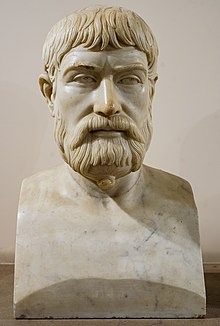
Back Pindar ALS Pindaro AN بندار Arabic بندار (كاتب اساطير من بويوتيان كونفيديراتيون) ARZ Pindar Azerbaijani Піндар Byelorussian Піндар BE-X-OLD Пиндар Bulgarian Pindaros Breton Píndar Catalan
Pindar | |
|---|---|
 Pindar, Roman copy of Greek 5th century BC bust (Museo Archeologico Nazionale, Naples) | |
| Native name | Πίνδαρος |
| Born | c. 518 BC[1] Cynoscephalae, Boiotia |
| Died | c. 438 BC (aged approximately 80) Argos |
| Occupation | Lyric poet |
| Genre | Poetry |
Pindar (/ˈpɪndər/; Greek: Πίνδαρος Pindaros [píndaros]; Latin: Pindarus; c. 518 BC – c. 438 BC) was an Ancient Greek lyric poet from Thebes. Of the canonical nine lyric poets of ancient Greece, his work is the best preserved. Quintilian wrote, "Of the nine lyric poets, Pindar is by far the greatest, in virtue of his inspired magnificence, the beauty of his thoughts and figures, the rich exuberance of his language and matter, and his rolling flood of eloquence, characteristics which, as Horace rightly held, make him inimitable."[2] His poems can also, however, seem difficult and even peculiar. The Athenian comic playwright Eupolis once remarked that they "are already reduced to silence by the disinclination of the multitude for elegant learning".[3] Some scholars in the modern age also found his poetry perplexing, at least until the 1896 discovery of some poems by his rival Bacchylides; comparisons of their work showed that many of Pindar's idiosyncrasies are typical of archaic genres rather than of only the poet himself. His poetry, while admired by critics, still challenges the casual reader and his work is largely unread among the general public.[4]
Pindar was the first Greek poet to reflect on the nature of poetry and on the poet's role.[5] His poetry illustrates the beliefs and values of Archaic Greece at the dawn of the Classical period.[6] Like other poets of the Archaic Age, he has a profound sense of the vicissitudes of life, but he also articulates a passionate faith in what men can achieve by the grace of the gods, most famously expressed in the conclusion to one of his Victory Odes:[7]
- ^ The Greek and Roman critics: "The odes of Pindar (522-443B.C.), written for the most part to celebrate victories in athletic contests, are interspersed with moral and philosophical reflections"
- ^ Quintilian 10.1.61; cf. Pseudo-Longinus 33.5 Archived 6 August 2011 at the Wayback Machine.
- ^ Eupolis F366 Kock, 398 K/A, from Athenaeus 3a, (Deipnosophistae, epitome of book I)
- ^ Lawrence Henry Baker (1923). "Some Aspects of Pindar's Style". The Sewanee Review. 31 (1): 100–110. JSTOR 27533621.
- ^ Gerber, p. 261
- ^ Pindar (1972) Introduction p. xv
- ^ de Romilly, p. 37
- ^ Bowra, Pythia VIII, lines 95–7
- ^ Pindar (1972) p. 144